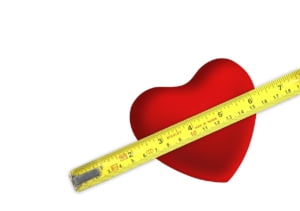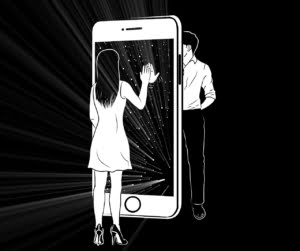Romantic love can be an unpredictable thing. We don’t always know when and how we’ll form a connection with someone that leads to a romantic relationship. Once formed, a romantic relationship requires time, energy, and creativity to nurture it and sustain its growth. A flourishing romantic relationship will typically gravitate toward something more permanent in marriage, where the couple hopefully continue to nurture their union.
Dating is the space where the seeds of romantic love are sown and begin to bud. It’s an exciting time of exploration, of the other and even of yourself. After all, as you date others, you develop a clearer picture of what you want in a relationship even as you grow in understanding what type of romantic partner you are.
Dating takes many shapes and forms, and not everyone enters it with the same goals or intentions. One form that dating takes is a long-distance relationship. This way of doing things has its pros and cons, which we’ll dig into later.
What is long-distance dating?
 Long-distance dating is when two people who are forging a romantic connection do so while they are physically separated from one another. The distance that separates them will vary. Some couples are in different parts of the city, and due to the demands of their work can only spend time in the same physical space on the weekends or on their off days.
Long-distance dating is when two people who are forging a romantic connection do so while they are physically separated from one another. The distance that separates them will vary. Some couples are in different parts of the city, and due to the demands of their work can only spend time in the same physical space on the weekends or on their off days.
Other couples are in different parts of the same state, in different states, and countries, or they may be separated by vast distances and across an ocean.
When you’re in a long-distance relationship, you’re not in physical proximity to one another, and so you must rely on technology to stay connected. A plethora of options are available to us, whether that’s by using email, phone calls, text messages, social media messaging, FaceTime calls, or going old school with snail mail.
These means can all be part of the way you get to know one another, share goals and dreams, and decide whether your commitment to each other ought to go further and deeper.
Why would you have a long-distance relationship?
A long-distance relationship has certain difficulties that an up close and in-person relationship does not, as we’ll note shortly. Given that, why would someone willingly have and be in a long-distance relationship?
There are several reasons why long-distance relationships are a thing, and why long-distance dating exists. For one thing, some couples may begin in the same space, but end up separated for one reason or another.
One partner may be in the military and get deployed. Job or schooling opportunities may open up elsewhere, forcing a move. In other situations, the couple may have started dating at a distance to begin with, having met online or perhaps through a mutual acquaintance.
When you care for a person and you’ve formed a meaningful personal connection with them, it’s hard to let something like distance get in the way of that. Finding a kindred spirit in our connected but increasingly fragmented world is difficult, and so people often embrace long-distance dating because it opens up the dating pool beyond just the people you see, and it allows you to continue cultivating an existing connection even when distance gets in the way.
 Wisdom for long-distance relationships
Wisdom for long-distance relationships
Some points have already been noted about the circumstances in which long-distance dating occurs, along with the challenges that come with it. If you’re in a long-distance relationship, or you’re contemplating dating someone long-distance, there are some pros and cons to consider.
This is not to either encourage or dissuade someone regarding long-distance dating, but to help one walk open-eyed into that situation. It’s better to contemplate the reality of the situation to make an informed decision than to walk blindly in without considering the dynamics of a long-distance dating relationship. Here are the pros and cons:
Pros
You can meet a wider variety of people
Unlike dating that’s limited by geographical location, when you date long distance, you can potentially meet a person from the other side of the world. If you’re in a small town or city, or the space that you’re in is culturally homogenous, long-distance dating opens up the dating pool.
It compels you to grow as a communicator
Communication is not only about expressing yourself clearly and well, but it’s also about knowing how to listen well and understand what someone is saying. This is how you know what the other person’s needs and interests are, and it’ll help you to meet those needs.
When you don’t have the luxury of eye contact, intonation, or body language to read what a person is saying, you either learn to deepen your empathy and ability to ask questions, or you’ll struggle with misunderstandings. In any relationship, conflict will arise, whether through misunderstandings or because of differences in opinion.
When you’re far apart from each other, it takes trust and skill to resolve these issues. Good communication will help a couple negotiate these challenges, and couples who gain these conflict resolution skills long-distance will be well-equipped to deal with future challenges in person.
It allows you to get to know each other well
Romantic relationships can be clouded by sexual chemistry. It’s easy to confuse lust with love. Long-distance relationships can be healthier than in-person relationships in this respect because they are founded on emotional intimacy and shared values rather than physical attraction.
Long-distance relationships are built primarily with your words. Some research suggests that while long-distance couples talk less frequently than those who live in the same city, their interactions tend to be deeper and more meaningful. This helps a couple get to know each other well and cultivate good habits of self-disclosure.
It can strengthen your bond of trust
Your imagination can run wild when you’re apart from your loved one. This can help increase the amount of trust you have in your partner and provide additional assurance in the relationship.
You might appreciate your partner more and value time with them
It’s easy to take someone for granted when you see them often. In a long-distance relationship, you just might appreciate your partner a little more than otherwise.
Being apart might also help you to see your partner’s gifts and positive aspects more clearly, and you value your time with them a bit more. The time you spend together is more memorable because it isn’t ubiquitous, and it helps you to focus on the things that matter.
 You can grow your patience and have time to self-introspect
You can grow your patience and have time to self-introspect
Long-distance dating can teach you to be patient and disciplined. Circumstances are often out of your control, such as if your partner’s phone dies or if they have an emergency before your call and they have no way of letting you know. Having time and distance apart can also help you gain clarity about your feelings toward them.
More time to pursue other passions and interests, developing one’s independence
Being apart from your romantic partner can afford you extra time, and this time can be used to develop yourself as a person. You can work out, be creative, spend time with friends, learn a new skill, and invest in other passions and relationships you have.
Being apart also means that you must tackle challenges that emerge in daily life on your own, whether that’s looking after your health, getting your car serviced, handling your finances, or making your meals. Being independent and self-sufficient makes you a more attractive, interesting, well-rounded, and happier person.
Cons
Emotional disconnection
It’s possible to share what’s going on in your life on the phone, but that’s not a substitute for experiencing them together. We are embodied beings, and an important part of how we experience life is by touching, smelling, tasting, hearing, and seeing.
When you’re in the same space you can take a walk in the park together, hold hands, share a laugh in the moment, and much else. It’s one thing to talk about what happened in your day, and quite another to experience it together and cultivate many shared experiences as a couple.
Easier to drift apart
Similar to the above point, it’s easier to drift apart when you’re physically apart. Having a separate life is great for independence, but it can also mean you grow apart more easily, developing vastly different interests and passions that you struggle to reconcile. Your frames of reference can shift to the point that you’re different people who can’t find their way back to each other.
It’s a huge but uncertain investment
When you’re dating, there is a level of commitment to one another, but it isn’t as settled as when you’re engaged or married. In your separate existences, you’ll meet many other people who may be more compatible as romantic partners. If your relationship doesn’t have a clear trajectory, it’s a huge ask to carry it on and relinquish other, more proximate potential relationships.
 It can be misleading
It can be misleading
When you’re not around a person all the time, it’s possible that you can build up a false image of who they really are. It’s easy to avoid the unpleasant things about them or forget an annoying habit they have.
Sometimes, we put our best foot forward when our encounters are planned. In this way, when we talk on the phone or prearranged video calls, we’re at our best, and this can create a false impression of the totality of who we are. This isn’t to say that you’re actively trying to mislead the other person, but it may be an unconscious act of self-editing.
Giving your long-distance relationship its best shot
Long-distance dating can be beautiful, complicated, messy, and deeply fulfilling. If you’re unsure about whether to enter or stay in a long-distance dating situation, get help, and speak with those closest to you. Proverbs 15:22 (NIV) says “Plans fail for lack of counsel, but with many advisers they succeed”. The people in your life know you and can be effective sounding boards to hear your concerns.
Additionally, you can speak with a relationship counselor, who can help you unpack and think through your decision to enter a long-distance situation. Not only can they equip you with skills such as conflict resolution and problem-solving, but your counselor can help you process and work through things to consider as you go forward.
Through counseling, you can become a better communicator, grow in empathy, learn about healthy boundaries, and much more, which will help you be a better romantic partner in person and at a distance.
“Measuring the Heart”, Courtesy of geralt, Pixabay.com, CC0 License; “Hands and Heart”, Courtesy of Tyler Nix, Unsplash.com, CC0 License; “Connecting Online”, Courtesy of Pheladiii, Pixabay.com, CC0 License; “About to Touch”, Courtesy of geralt, Pixabay.com, CC0 License



